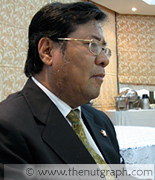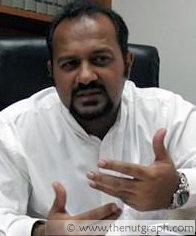By Ken Vin Lek - Free Malaysia Today
PETALING JAYA: Malaysia is emerging as a fascist state after five decades of Barisan Nasional-Umno rule, says PKR supreme council member Zaid Ibrahim.
Speaking at the launch of Friends of Pakatan Rakyat (FPR) at Holborn, London, over the weekend, Zaid likened Malaysia to an ailing nation with a sordid democracy -- its body and vital state institutions all in intensive care.
About 200 people including social activists, Pakatan Rakyat members and reporters were present.
“The medication now being pumped into the sick body of this nation is fascism... fascsim has a penchant for abusing religious or ethnic identities, where they are moulded into a culture of supremacism,” he said.
“The Malaysian state right now distorts and cheapens the sacred core values of our cultural traditions beyond all recognition, so that they can be sold off as the ultimate political drug by BN.”
Zaid, who spoke with candour about the state of affairs in Malaysia, also touched on the Malaysian constitution, describing its spirit as being seriously abused over the years.
“The constitution is a document embedded with great political vision and hope, designed with an intricate system of checks-and-balances to manage justly the conflicting interests of individuals, communities and states.”
“Today, however, the spirit of the constitution has been seriously injured, as a result of the years of abuse, perpetrated through brute force by those with vested interests who turned away from liberty, justice and equality during the judicial crisis of 1988,” he added.
Zaid also hit out at Umno for its transgressions, including abusing democratic and public institutions, making a mockery of cultural values, and taking a skewed approach in defining morality.
He said that political survival of BN is meaningless without principles incorporated into its system.
Relationship with Raja Petra
Earlier last week, Bayan Baru MP Zahrain Hashim exposed details of a meeting between Zaid and fugitive blogger Raja Petra Kamarudin (RPK) in Manchester, UK, last year.
Reacting to it, Home Minister Hishammuddin Hussein questioned Zaid’s relationship with RPK, saying that the former must clarify it to the people.
Zaid said that he is prepared to meet Hishammuddin and explain to him his relationship with RPK, provided that it is held in a public place.
He described RPK and private investigator P Balasubramaniam as men who sacrificed their freedom by living abroad because they fear for their safety.
(Balasubramaniam had gone missing in July 2008 after linking Prime Minister Najib Tun Razak and his wife Rosmah Mansor in his first statutory declaration involving the murder of Mongolian translator Altantuya Shaaribuu.)
“The more significant question is: why is my relationship with these gentlemen more important to the government than the truth of the contents of their statutory declarations or affidavits?”
“Shouldn’t the government give them suitable guarantees for their safety and persuade them to come back? We must all remember that Balasubramaniam and RPK are not criminals on the run as there were no charges against them, no warrant of arrests, no offences committed... so why shouldn’t anyone be seen with them?” asked Zaid.
Role of Malaysians abroad
Zaid also said Malaysians who lived abroad have an important role to play in the affairs of the country.
“As Malaysians, you must collectively demand that the Election Commission recognise the rights of Malaysians all over the world to vote.”
At present, Malaysians residing abroad are not allowed to vote in general elections via postal votes, a system practised by many democratic countries.
“The present definition of ‘absent voter' has to be expanded to include you. If you have to take the matter to the courts or to the United Nations, just do it,” Zaid said.
He appealed to overseas Malaysians to rebuild the nation with sincerity, and offered the leadership of Pakatan for a better Malaysia.

Anwar accused the federal administration of capitulating to Singapore’s demands. — file pic
MUAR, July 5 — Datuk Seri Anwar Ibrahim continued to pour scorn on the Najib administration’s recent land-swap deal with Singapore, saying Malaysia
“Tanjong Pagar is our land... this land is KTM land,” the de facto PKR chief said last night after a meeting with Johor party leaders here.
“As long as KTM trains go to Tanjong Pagar, that land belongs to KTM, meaning Malaysia,” said the former deputy prime minister.
He said “the law was clear” and that Malaysia should have sent a train every week from Kuala Lumpur or Johor Baru to Tanjong Pagar just to fulfil that condition.
“Who decides [whether the train goes to Tanjong Pagar]? We decide... To protect our land, we can send [a train] once a week,” Anwar said.
The railway land was acquired under a 1918 colonial ordinance specifically for use by Malayan Railway (KTM) for a period of 999 years. That same ordinance limits the use of this land.
The land swap has been contentious since the Malaysia-Singapore Points of Agreement (POA) was signed in 1990 over the issue of the future of the railway land. The POA was signed between former Singapore prime minister Lee Kuan Yew and former Malaysian finance minister Tun Daim Zanuddin.
Under the agreement, KTM was to vacate its historic station at Tanjong Pagar and move to Bukit Timah while all of KTM’s land between Bukit Timah and Tanjong Pagar would revert to Singapore.
But the key contention was the interpretation of the agreement as Singapore insisted the agreement meant KTM had to move its terminal from Tanjong Pagar to Bukit Timah within five years of its construction, when the republic moved its railway immigration in August 1998.
Putrajaya, however, said it would only be effective once it decided to move the station.
The land at Tanjong Pagar would be handed over to a private limited company for joint development, of which its equity would be split 60 per cent to Malaysia’s Khazanah Nasional Berhad and 40 per cent to Singapore’s Temasek Holdings, according to the POA. Anwar said that while Johor had to maintain good ties with neighbouring Singapore, that did not mean it had to accede to every demand by the island republic.
“We have to be good to Singapore. We want them to invest here and we want to invest there... But does being good mean you have to give everything to them?” he told the 400-strong crowd who came to hear him speak.
The former finance minister said he had no problem with Singapore wanting to negotiate with the Malaysian government but stressed that the agreement should have been looked at more closely.
“When you talk to our friends in Singapore, they are smart, they are serious... that’s why before I went, I examined [the POA] in detail. [I had a] full understanding,” he said.
“This country has the resources. But now, it’s all gone... so how do you go on to respect the leadership of this country?”
Malaysia will soon re-locate its railway and Customs, Immigration and Quarantine (CIQ) complex to the Woodlands train checkpoint.
The relocation, to take place on July 1 next year, marks a major step in resolving a number of outstanding bilateral issues between the two countries, as first reported by The Malaysian Insider last Sept 29.
The two governments will also form a company to jointly develop parcels of land now owned by KTMB.
Both countries also announced that a company, known as M-S Pte Ltd, will be established no later than Dec 31 this year to jointly develop the parcels of land.
The three parcels of land in Tanjong Pagar, Kranji and Woodlands, along with another three pieces of land in Bukit Timah, will be vested by M-S Pte Ltd for joint development, which in turn could be swapped on the basis of equivalent value for pieces of land in Marina South and/or Ophir-Rochor.





 By G Vinod - Free Malaysia Today
By G Vinod - Free Malaysia Today












 As such, the BN and all its component parties must now be prepared to face the 13th general election without dilly-dallying anymore, he said.
As such, the BN and all its component parties must now be prepared to face the 13th general election without dilly-dallying anymore, he said.
 A shouting match started about half-hour into the rally at 2pm between the gatecrashers and GAS supporters.
A shouting match started about half-hour into the rally at 2pm between the gatecrashers and GAS supporters. The MIC supporters initially refused, saying, "If we leave, everybody has to leave!"
The MIC supporters initially refused, saying, "If we leave, everybody has to leave!" Amidst the uneasy compromise, former Petaling Jaya MIC leader V Subaramaniam - more popularly known as Bharat Maniam - in his speech thanked the police for protecting the participants of the peaceful gathering.
Amidst the uneasy compromise, former Petaling Jaya MIC leader V Subaramaniam - more popularly known as Bharat Maniam - in his speech thanked the police for protecting the participants of the peaceful gathering. Some of the MIC supporters, which by 3pm had increased to about 100, even tried to start a second shouting match with those inside the hall.
Some of the MIC supporters, which by 3pm had increased to about 100, even tried to start a second shouting match with those inside the hall.



